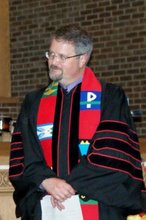
Bob Cornwall, pastor of Central Woodward Christian Church (Disciples of Christ) in Troy, MI, has a blog spot titled: “Ponderings on a Faith Journey: The Thoughts and Opinions of a Disciples of Christ pastor and church historian”. Pastor Cornwall has written a series of blogs on Wildman and Garner’s book, Lost in the Middle?
The latest blog entry on this topic, “Unity not Uniformity”, traces the significance of the proclivity towards being “around people with whom we agree” and the fear involved in being around those with whom we disagree. Cornwall challenges his readers to “embrace the principle of radical inclusivity” propounded in Lost.
Moving towards a “liberal-evangelical” stance involves challenges on both relational and individual levels. Citing Lost, Cornwall encourages each individual to affirm his or her beliefs while giving space to those with differing beliefs. With the realization that “each of our journeys are at different places”, Cornwall is able “to find unity without uniformity.”
Other blog entries strive for a “compelling core message” that encourages a “cohesive community” without sacrificing breadth or depth. Cornwall also stresses the importance of embracing the ambiguity, gray areas, and unanswered questions involved in learning to function between extreme conservativism and extreme liberalism.
Some entries have a more intimate tone, such as “Finding that Place in the Middle.” Here Cornwall discusses a retreat that challenged him to consider the difficulties involved in discerning a liberal-evangelical balance. One of the debates during this retreat revolved around the question of “whether Jesus is the only means of salvation.” On the one hand, being liberal means “being open and inquisitive, tolerant and accepting.” On the other hand, being evangelical means embracing “the good news that God has visited this planet in Jesus” and affirming “the fullness of the New Testament story.” Further, a moderate liberal-evangelical stance means that one shouldn’t make judgments about others’ standing before God. Importantly, this stance is “not a compromise, but a realization of the full meaning of the Gospel.”
For these reasons Pastor Cornwall can focus his preaching and his praying on Jesus, and be a self-identified “evangelical universalist, who takes the bible seriously, though not always literally.”
Visit Pastor Cornwall’s blog.

